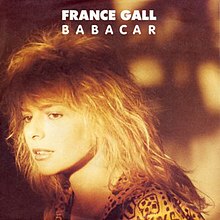
"Désenchantée" is a song recorded by French singer-songwriter Mylène Farmer. The first single from her third studio album L'autre..., it was released on 18 March 1991 and achieved great success in France, topping the charts for more than two months. It has been Farmer's most successful song and is generally considered her signature song.

"The Promise You Made" is a song by Cock Robin. Written by Peter Kingsbery, the song was recorded in 1984 for the group's self-titled debut album. It was released as a single first in the US in November 1985, then in early 1986 in Europe where it became a big hit.

"Comment te dire adieu" is a French adaptation of the song "It Hurts to Say Goodbye". It was originally recorded by Françoise Hardy in 1968.
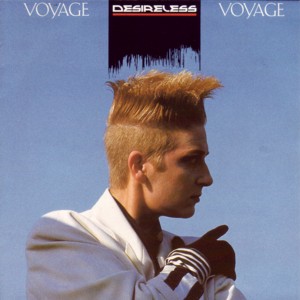
"Voyage, voyage" is a song by French singer Desireless, released as the first single from her debut studio album, François (1989). It was written by Jean-Michel Rivat and Dominique Dubois, and produced by the former. Sung entirely in French, the song transcended the language barrier on the music charts and became a huge international success between 1986 and 1988, reaching the top position in more than ten countries across Europe.

"Ella, elle l'a" is a single released by French singer France Gall. It was released as a single from her album Babacar, on 24 August 1987, and became a hit across Europe, the Americas and Asia. It was covered live by French singer Alizée at a TV show in 2002 and by Belgian singer Kate Ryan in a dance version in 2008.
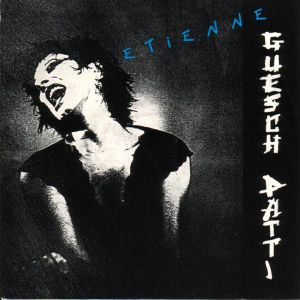
"Étienne" is a 1987 song recorded by French artist Guesch Patti, from her album, Labyrinthe. It was released as her debut single in late 1987 in several European countries. Particularly famous for its suggestive music video which was censored on certain TV channels, the song was a great success in France, Italy, Switzerland, Austria and Germany where it was a top ten hit.

"Viens boire un p'tit coup à la maison" is a 1987 song recorded by the French band Licence IV. Released as a single in March 1987, the song achieved a huge success in France, becoming one of the best-selling singles of the 1980s in France. The band did not release another song, nor any album.

"Là-bas" is a 1987 song recorded as a duet by the French singer Jean-Jacques Goldman and the British-born artist Sirima. It was the second single from Goldman's 1987 double album Entre gris clair et gris foncé. It was a smash hit in France and became a popular song throughout the years.
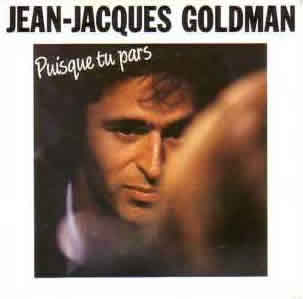
"Puisque tu pars" is a 1987 song recorded by the French singer Jean-Jacques Goldman. It was released in July 1988 as the fourth single from his album Entre gris clair et gris foncé, on which it features as the sixth track in an extended version. The song was a number three hit in France.

"C'est ta chance" is the name of a 1987 song recorded by the French singer and songwriter Jean-Jacques Goldman. It was released in April 1988 as the third single from his album Entre gris clair et gris foncé, on which it features as the fifth track. The song achieved a moderate success in France, in comparison with Goldman's previous and next singles.
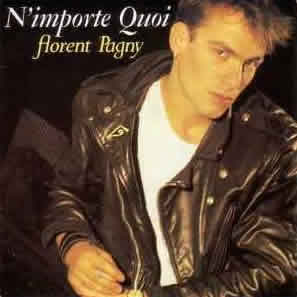
"N'importe quoi" is the name of a 1987 song recorded by the French artist Florent Pagny. It was his debut single, released in March 1988. It became a big hit in France, topping the chart for two months and is Pagny's second best-selling single in terms of charts and sales, after "Savoir aimer".

"L'Aziza" is the name of a 1985 song recorded by French singer Daniel Balavoine and released as a single from his album Sauver l'amour in October 1985. The song was very successful, particularly after the singer's death, topping the chart in France for two months.
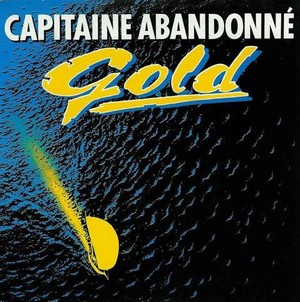
"Capitaine abandonné" is a 1985 song recorded by French band Gold. It was the lead single from the band's second studio album Capitaine abandonné on which it features in an extended version as first track. The song was also available in its main version on the next album Calicoba, released in late 1986. "Capitaine abandonné" was released as Gold's second single overall in January 1986, and met with a success in France where it was a number-one hit.

"Évidemment" is a 1987 pop song recorded by French singer France Gall. It was the third single from her album Babacar and was released on 7 March 1988. In France, the song achieved success, becoming Gall's third top ten hit.
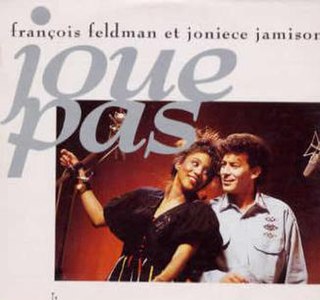
"Joue pas" is a 1989 song recorded by French artist François Feldman as a duet with the American singer Joniece Jamison. It was released in July 1989 as the first single from Feldman's album Une Présence, and was his fifth single overall. It achieved great success, becoming a number two hit and a popular song throughout the years.
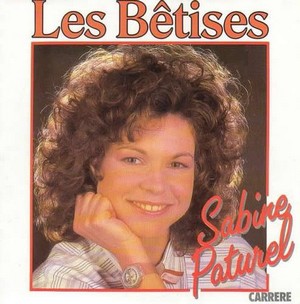
"Les Bêtises" is a 1985 song recorded by French artist Sabine Paturel. Released in March 1986 as her debut single from her album Cœur Bébé, released two years later, on which it is the sixth track. The song was a smash hit in France, though it failed to top the chart. It was covered by several artists throughout the years and became a popular song.

"Qui a le droit..." is a pop song recorded by French artist Patrick Bruel. Written and composed by Gérard Presgurvic and Patrick Bruel, it was the first single from his album Si ce soir..., recorded after his first concerts tour. It was released in a live version in late October 1991 under RCA label and was a hit in France, becoming Bruel's only number-one single.

"Une autre histoire" is a 1987 pop song recorded by French singer Gérard Blanc. It was the first single from his debut album Ailleurs pour un ailleurs and was released in May 1987. It became a smash hit in France in the summer and was covered by several artists throughout the years, thus achieving cult status. It can be deemed as the singer's signature song.

"C'est la ouate" is a pop song recorded by French artist Caroline Loeb. It was the first single from her album Loeb C.D. and her second single overall. It was released in late 1986 and published by Barclay editions. It became a big hit in France, Germany, Italy, Spain and Argentina where it became a top ten hit, and was covered by many artists throughout the years.

"Diego libre dans sa tête" is a 1981 song written by Michel Berger for his wife France Gall for her studio album Tout pour la musique, on which it is the eighth track. Two years later, Berger himself recorded his own version of the song. In 1991, it gained popularity when Johnny Hallyday released a live cover which became a top ten hit in France.
